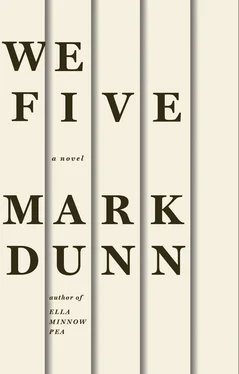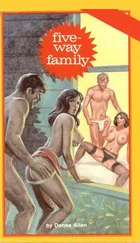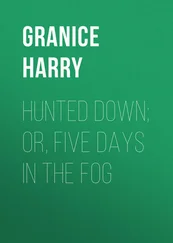The two fell into one another’s arms without the exchange of a single word. The door was shut, and all the world that had no place or claim on this moment was shut out with it.
San Francisco, April 1906
The waiter swept his arm before him — silent indication that Cain and Ruth had their pick of all the tables in the empty tearoom.
“That sunny spot over there,” suggested Ruth, “right next to the door to the balcony.”
The waiter nodded and led the couple to the table Ruth had selected. But Ruth didn’t sit down. Instead, she stepped through the open door. The balcony commanded a generous view of Dupont Street all the way down to Bush. Cain joined her.
“How did you find this place?” Ruth asked, her gaze drawn to a fish stand and the two men haggling stridently in front of it. This being a Saturday afternoon, Chinatown’s main thoroughfare was bustling with boisterous, clamorous activity.
“I come here now and then. It’s popular with some friends of mine.”
“The men with whom you work at the advertising agency, or a different set?”
“A very different set. The proprietor of this place is happy to entertain the patronage of Occidentals for whatever their purpose might be. The Plague’s been over for some time now, but non-Asians — as a rule — still can’t find the nerve to venture back into this part of town.”
Ruth stepped back into the room and sat down. Her eyes wandered about the room. She counted herself among those who seldom came to Chinatown, though she’d heard that it had many interesting restaurants and tasty noodle shops. The room was gaudily ornamented in the Oriental style. The walls were painted bright blue and adorned with vertical Cantonese legends in silver and red. The tables were partitioned off from each other by large screens of elaborately gilded ebony, a material echoed in the tables and stools themselves, each stool inlaid with a slab of speckled marble. The gas chandelier suspended from the ceiling in the center of the room was strung with tinsel, which glittered even in the suffused light of its subdued gas jets.
“It seems to me,” said Ruth, running her palm along the contour of the smoothly polished table, “that this is one of those places where San Franciscans come who want very much to be left alone.”
The waiter handed Cain a menu and took a few steps back. “And you’d be totally correct in that assumption,” said Cain, his eyes now lowered upon the menu.
“What happens in those curtained-off rooms over there?” asked Ruth with casual curiosity.
Cain glanced up. “Opium smoking, for the most part, but other things take place there too — human activities that aren’t much spoken about in polite company. Do you mind if I order for the both of us?”
“Not at all.”
Cain signed to the waiter that he was ready to place his order. “A pot of Black Dragon, if you please. And we’ll have a platter of the pickled watermelon rinds and candied quince.” Turning to Ruth: “Do you like dried almonds?”
“More than pickled watermelon rinds, I think.”
Cain laughed. “Today you are being adventurous, whether you like it or not.” To the waiter: “And the dried almonds. Thank you very much.”
As the waiter receded from the room, two young Occidental men retreated on his heel. They had just emerged from one of the curtained rooms. Both were dressed in bright and unconventional colors, the more pavonine of the two fumbling with the tying off of a large purple cravat, which had apparently been removed and was now being restored to his ensemble.
Ruth arched an eyebrow. “Do you come here often?”
“Not as often as some.”
“Well, Mr. Pardlow, your secret is safe with me, as is anything else you may wish to tell me this afternoon — including whatever it is that has necessitated our coming to your hideaway in the first place.”
Cain, who had been distracted by the sudden emergence of the two young men, now purposefully returned his gaze to the woman seated across from him. “I’ve made a decision, Miss Thrasher — one which obviates the need for the two of us to do or pretend to do anything.”
“Have you arranged with a few of your Barbary Coast associates to have certain individuals we know shanghaied ? I hear there’s a lot of that going on these days, and it could prove very advantageous in our present situation.”
Cain hooted with laughter. “Now just what do you know about shanghaiing?”
“I read , Mr. Pardlow.”
“ That , Miss Thrasher, is undeniable fact.” Cain settled back in his chair and laced his fingers. “My decision has to do with me , Miss Thrasher. I’m leaving San Francisco — moving to New York. I’ve come to the conclusion that it’s only been my fondness for Pat Harrison that’s kept me here for so long. But it’s sheer lunacy for me to continue to maintain a professional and fraternal association with three men who utterly repel me, all for the, the, the tenuous privilege of sustaining a friendship with Mr. Harrison that is — if I may be honest — one-sided and totally unfulfilling. So I will fly, Miss Thrasher, and I will start my life anew. And you’ll be happy to know that I require nothing from you but your valedictory good wishes.”
“Which I’m most happy to give you. But what about Will Holborne’s threats to expose you if you don’t play out that diabolical game of theirs?”
“If he should follow up with those threats out of some diseased form of vindictiveness — if he, to be more specific, intends to divulge certain of my proclivities to my father’s opponents in his race for state senate — then so be it. Dad’s given me nothing in all these years that I couldn’t have just as easily received in one of the city’s most miserly orphanages. ‘Everyone by his own bootstraps!’ That’s been the precept his four children were expected to live by. So what I now do with my own bootstraps should be of no relevance to him whatsoever. I can’t believe it’s taken me this long to come to such a simple conclusion.”
“So just as we’re becoming good friends, you take yourself three thousand miles away.” Ruth made a comical moue with her mouth. “What arrant inconstancy!”
“Then come with me.”
Ruth’s eyes grew big.
“ You want to write,” he elaborated. “ I want to write. So let’s the two of us move to New York City and see if we can make a go of it.”
Ruth didn’t respond. She was thinking the proposition over. She was, in fact, giving it very serious thought while trying with all her might to tame the feeling of sudden, bursting euphoria that accompanied it.
She was thinking of it still when, after saying good-bye to Cain and upon her walk home, she spied her friend Jane and the advertising man named Katz headed in the direction of Higgins’ Emporium. Both seemed drunk, and Ruth didn’t like at all the way he was touching her in the bright light of day. Not wishing to face the situation by herself, Ruth quickly turned herself around and headed in the opposite direction — hurrying in a near trot to nearby St. Francis Hospital, where Carrie could be found attending her mother.
“Now this place is the real goods!” pronounced Tom as he followed Jane into the Higgins’ back parlor. “Homey, but with a personal stamp. Say , nice touch: that floor vase with the what’s-it grass and the gilded cattails.”
“It’s pampas grass. Thank you. My mother was very fond of cattails.”
Tom resumed his impromptu appraisal of the room: “The only thing missing is a wheezy old parlor organ and a lumpy old easy chair for Papa Bear to smoke his pipe and browse the Examiner. ”
Читать дальше












